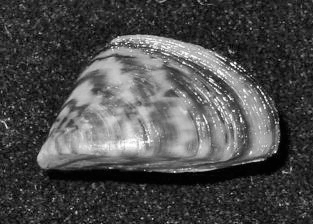A Striped Menace Threatens Our Ponds and Lakes
By Star Childs
As summer approaches and thoughts turn to boating on freshwater lakes and rivers, everyone must be vigilant of a new ecological threat to our bodies of water. Zebra mussels, Dreissena polymorpha, have made their way from the distant Black and Caspian Seas of Eurasia and Russia to our Great Lakes and other waterways. Last summer, the first occurrence in Massachusetts was discovered in Laurel Lake in the Berkshires, only 30 miles away, and they are also believed to have made it to Twin Lakes in Salisbury.

Beware: this demon of the deep, also known as a zebra mussle, is causing havoc in Connecticut waters.
The small bi-valves, often with stripes along their shells, now occupy niches formerly the terrain of our own indigenous mussels. They attach themselves to almost any surface in the water. Clinging to rocks on lake bottoms, they are razor sharp and very dangerous to waders who are not wearing water shoes. Even worse, they threaten to clog the intake pipes of municipal water facilities. Annual efforts to remove encrustations of mussels run in the hundreds of millions of dollars.
These freshwater invaders have proven themselves capable of traveling long distances by attaching themselves to anchor chains, ropes and fishing tackle. They can also exist for long periods as microscopic larvae in bilge water, or stuck to the undersides of virtually any freshwater craft that is carried from one lake or river to the next.
Consequently, lake property owner associations throughout the Northeast have begun campaigns of public awareness or are passing outright boating bans. The Great Mountain Forest Corp., which leases the Tobey Pond beach to the town, initially put the town selectmen and beach managers on alert, to be sure all boats brought to Tobey had been treated for possible mussel contamination. The potential threat to Tobey and any other Norfolk lake or pond is just too great to take any chances. Recommended treatments are to wash down the hulls and oars of any boat, canoe, or kayak with a five percent Chlorox and water solution, leaving them out in the full sunlight for at least half a day before conveying them to the water. This ensures that the microscopic larvae will become dehydrated and die.
The ecology of Norfolk’s ponds and lakes would be severely impacted should the zebra mussel arrive here. Their filter feeding habits are so successful that they have starved out other native mussel species. They have also been implicated in the outbreaks of toxic blue-green algae blooms, which release botulism-like compounds called microsystins that have killed any waterfowl and small animals that have come into contact. So efficient is their filtering capacity that they can drastically increase the clarity of the water as to allow sunlight to penetrate much deeper, causing algae growth at greater depths. It is imperative to keep this striped invader out of our ponds and lakes.
Photo Courtesy Of USGS.GOV
